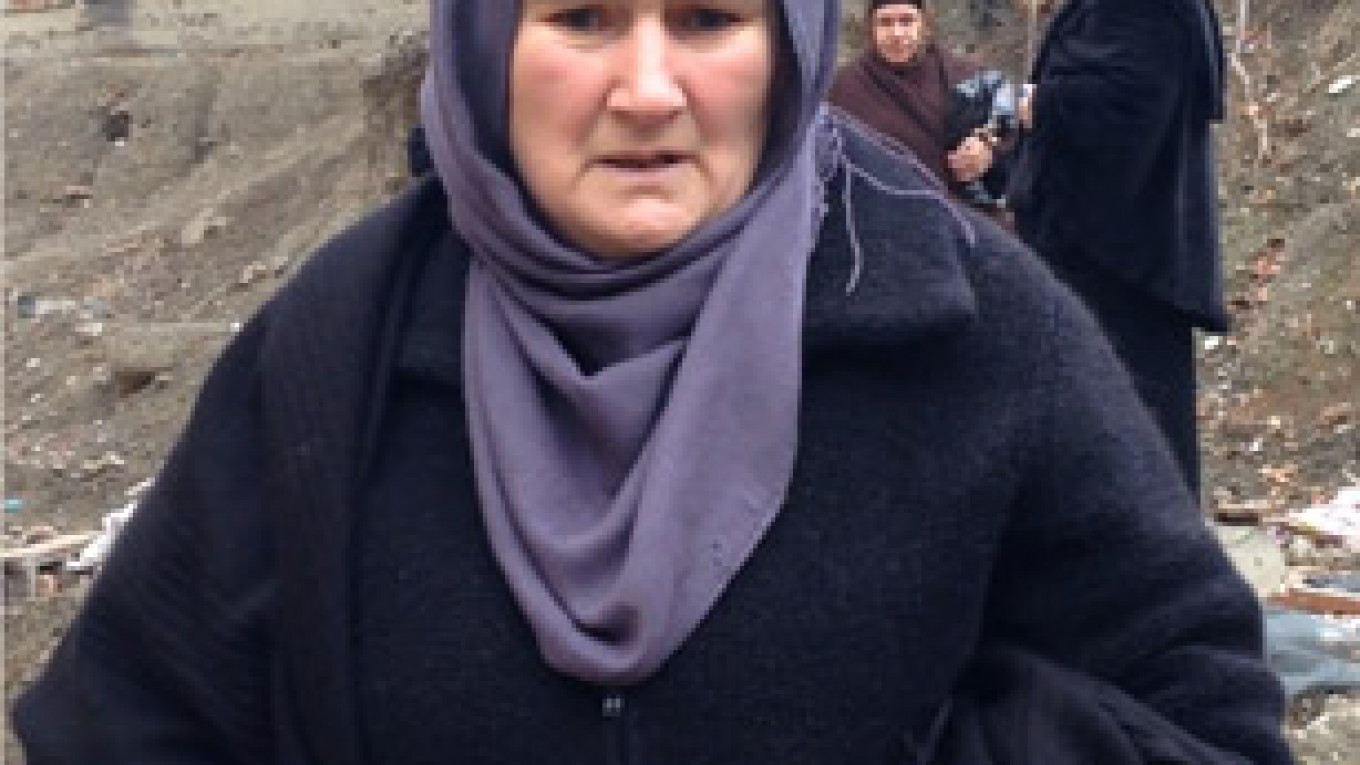As the car crawls through the fog on an icy road in the Caucasus Mountains, my phone keeps ringing. "Are you by any chance in Donetsk? Does Human Rights Watch have someone in eastern Ukraine now?" I reply, "We sure do. But I happen to be in Dagestan and there is this outrageous situation. … Oh, just the contact details for my colleague in Ukraine?"
The dramatic events in Ukraine have almost fully eclipsed the gruesome developments in Russia. With a war raging next door, very few reporters or policy-makers think about Dagestan, the most turbulent region in Russia's North Caucasus. This region has a jihad insurgency and an abusive government counter-insurgency that has caused tremendous suffering.
Very few people outside Dagestan know about the remote mountain village of Vremenny, with just over 1,000 residents. Even fewer paid attention when on Sept. 18, Russian military, security services and Dagestani police surrounded the village. The next day, a large-scale counter-insurgency operation began in Vremenny. Armed military personnel searched every house. They led away four local men without explaining where, or why they were taking them. Three were later released, but 30-year-old Sultanbek Khapizov has not been seen since, a victim of a sinister enforced disappearance.
The soldiers rounded up every villager, including women and children, into buses and took them to nearby improvised "filtration center," where they were photographed, registered, and assigned a number. Some were interrogated.
To quell the villagers' anxiety, the officials promised that everyone would return home in a few hours, but it took much longer. Children were getting hungry and wouldn't stop whining. Women were pleading to be allowed go get some food and a shawl. All to no avail. And when it was over, the soldiers said women and children were free to return but no men would be allowed back into the village.
People were shocked. They had no warning, so the men never even thought of bringing any money or a change of clothes. The women started screaming that they would not be parted from their men, and the officers shrugged, "You can go with them if you want."
Some of the men went to stay with relatives in the nearby village of Gimry or in Makhachkala, the republic's capital. Others went off alone — in Dagestani mountain villages, having more than five children is common and finding someone to host such a large brood is no easy task. In any case, they all hoped the operation would be over in a few days.
But it took more than two months. The security forces searched the houses many times over, they broke floorboards and made holes in the walls. They were looking for rebels and weapons caches, typical for a counter-insurgency operation.
After the first couple of weeks, most of the women who remained in Vremenny with their kids gave up and left — they were afraid of the armed personnel, many of them rude and drunk, roaming around the village, repeatedly tearing the houses apart, grilling the people about rebels and weapons. No one else was allowed inside the village. Not a single journalist or rights activist could provide first-hand reporting on what was going on.
On Oct. 6, the security forces demanded that the remaining villagers — about 70 in all — leave at once for their own safety because they anticipated an imminent clash with the rebels. Among them were mothers with sick children and two elderly people who cared for their paralyzed, blind, and deaf 10-year-old grandson. The security forces did not provide any transport to evacuate people. So the villagers had to walk and carry the sick.
Officers told the villagers that they could simply stand on the road near the village for a few hours and return by nightfall. As a result, most did not pack any belongings. But come nightfall, the security forces still did not let them return. People were finally allowed to return to Vremenny on Nov. 26 — to realize that some of them no longer had a home. The luckier ones still had a roof over their heads but lost most of their property.
The village was devastated in a way only a war zone can be. A dozen houses were blown up, another 40 damaged beyond repair. Those that weren't destroyed were stripped bare inside. There was neither electricity nor water. All the infrastructure was wiped out.
When I traveled there last week, Vremenny reminded me in an uncanny way of the most damaged towns in eastern Ukraine. Only in this case some of the houses were not only severely damaged or destroyed but razed to the ground. At first glance you could not have guessed that a few months ago those sites strewn with debris had been human dwellings.
Since the counter-insurgency operation finished at the end of November, the government has done nothing to rebuild Vremenny. The village remains uninhabitable. A few dozen women came from Gimry to meet me in the center of what used to be Vremenny. Each one pulled me by the hand toward what remained of her house, cried and listed all the things that her family no longer had. Their raw despair, the intensity of their plea for help and their burning need to tell the story were staggering.
In addition to destroying the place, the security forces — and it could only have been them because access to the village to anyone else was strictly banned — looted everything of any value — refrigerators, televisions, kitchen equipment, carpets. What they did not steal they destroyed — chopping up furniture, throwing clothes, pots, pans and all sorts of other things into the mud. They covered walls of the houses with offensive drawings. They damaged everything they could get their hands on, even a Koran, which bore slice marks from a sharp-edged object.
According to the authorities, a dozen rebels were supposedly killed during the two month operation in Vremenny and some weapons and ammunition were found in the village. Whether or not this is true, the operation punished the entire village.
According to the villagers, despite all of their pleas to the authorities, they are not recognized as internally displaced persons, the government is not providing any relief and apparently does not intend to pay compensation quickly or provide housing soon. They are not receiving any assistance except from relatives, friends and rare private benefactors.
A government commission recently assessed the damage in Vremenny and recognized 42 houses as "unlivable." Their residents should eventually receive between 50,000 and 100,000 rubles in damages ($800-$1600) — a derisorily low amount. The villagers were also told by a range of local officials that they won't be getting even that if they keep talking to the media and rights groups.
When I was leaving Vremenny, a big-boned woman in a flowered headscarf could not stop crying. "No one cares. We went to see a government official just before New Year — we made an appointment because we were asking the authorities to contribute some books, crayons, toys, as holiday gifts for our kids, who have nothing at all," she said.
"So, we waited and waited and finally the secretary says that her boss won't be back anytime soon. She is at a government meeting about arranging for a convoy of gifts to the children of Donetsk, in eastern Ukraine. … And we are standing there and thinking, what about our children?"
Tanya Lokshina is Russia program director at Human Rights Watch.
A Message from The Moscow Times:
Dear readers,
We are facing unprecedented challenges. Russia's Prosecutor General's Office has designated The Moscow Times as an "undesirable" organization, criminalizing our work and putting our staff at risk of prosecution. This follows our earlier unjust labeling as a "foreign agent."
These actions are direct attempts to silence independent journalism in Russia. The authorities claim our work "discredits the decisions of the Russian leadership." We see things differently: we strive to provide accurate, unbiased reporting on Russia.
We, the journalists of The Moscow Times, refuse to be silenced. But to continue our work, we need your help.
Your support, no matter how small, makes a world of difference. If you can, please support us monthly starting from just $2. It's quick to set up, and every contribution makes a significant impact.
By supporting The Moscow Times, you're defending open, independent journalism in the face of repression. Thank you for standing with us.
Remind me later.








